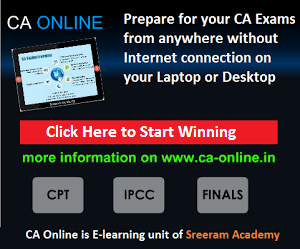 CA IPCC: Important questions / Chapters / Topics for May 2014 exams, Preparation Tips of Group 1 Accounting, Law, Costing and FM and Taxation
CA IPCC: Important questions / Chapters / Topics for May 2014 exams, Preparation Tips of Group 1 Accounting, Law, Costing and FM and Taxation
(Extracts of notes by previous toppers)
Accounting:
Group-I Accounting is all about common sense. This is one of the important subjects, because, it helps a lot in securing the required aggregate marks in the group. A few recent facts are stated below:
On a sample survey of last four IPCC exams, it was found out that, if you take 100 students who have secured exemption in Group 1, among those 100, a staggering 60-70 number of exemptions have come from the Accounting subject.
In another survey of students who failed in the May 2013 exam but got an exemption in one or more subject, there are 68% students who have got their exemption only in Accounting.
The trick is choosing a wise material. Recent toppers have stated that, ICAI’s practice manual is the best and that’s what makes the difference.
Important Chapters/Topics:
- Partnership – Retirement
- Single Entry
- Insurance for loss of Profit
- AS 6,9 and 10
Law Ethics and Communication:
We have conducted a survey of 160 students who have secured exemption in Law. Below are a few notes they have made:
Side-headings, Side-headings and Side-headings. 56% of the students have told the same thing. The importance of sub-headings. Once you write a suitable sub-heading, the examiner will have no need to go into the matter.
70% of the students have given the credit to Ethics and Communications. Ethics and Communications have a comparatively very much smaller syllabus. Combined reading based on sub-headings have got them the success.
For Law, most of the students have credited the need of ICAI Practice Manual.
Important Chapters/Topics:
- Meetings, Incorporation
- Workplace Ethics, Ethics in Accounting and Finance
- Communication channels and Ethics
Costing and FM:
Recent stats say that, out of the students who have failed Group-1, 72% have failed in Costing and FM along with some other subject, and 46% students failed only in Costing and FM.
This subject has two shades. It has been a boon for a set of students and for some, it has been a curse.
So we decided to go deep into the matter and have inquired 300+ students, which includes students who have been failing this subject for at least two attempts and students who have got exemptions. We also extracted much needed info from a student from Vijayawada who scored 86 in this subject.
Almost all the students who succeeded in this have noted the same point, PRACTICING WITH PEN AND A BOOK. A close analysis of the preparation style of students who have been failing revealed that, most of them were just going through the questions and not putting them on to the paper. Not just Seeing, PRACTICE, PRACTICE and PRACTICE. By looking at the book, it looks like everything is ok, but once you put the pen on the paper, it wont move after two steps.
Second point is the presentation. Costing is all about presentation. You may bring the solution, but unless you present it in a format, you are not going to score marks. We have obtained the certified copies of a few students which revealed the same.
Important Chapters/Topics:
Costing:
- Material Cost
- Contract Costing
- Marginal Costing
- Joint and By Products (Theory)
Financial Management:
- Cost of Capital
- Cash Flow Statement
- Management of Working Capital
Taxation
Exam point of view, the first thing you need to start and finish is VAT, and then Service Tax and then move on to Income Tax.
There have been plenty of amendments in Service Tax and recent Practice Manual is well updated with all the changes and very good practical questions.
Most important point you should remember while preparing for Taxation is, NEVER READ A BULK OF SYLLABUS IN A SINGLE DAY. Taxation is a tricky subject who should be prepared over a period of time. Don’t finish topics in a single stretch. For that day you may feel like you got that but after a week, everything comes to the starting point. Slow and Steady.
Killer tip: Go though Amendments made in Finance Act, 2013. A minimum of 50-55 Marks will be covered from those topics only. Download these Amendments here
Important Chapters/Topics:
- Residential status, Clubbing, House Property
- ST: Valuation, POT, Returns
- VAT: Calculation and procedures
Important Theory Questions:
- Service Tax @ Life Insurance business
- Benefits of Composition scheme under VAT
- Advance Payment of Tax on Capital Gains (5M)
- Deduction u/s 80CCG
- Section 197A (1F)
- Service Tax on Vocational Course offered by Govt Org
Group -2:
Advanced Accounting
Students are advised to prepare the Advanced Accounting paper from ICAI's Study Material. Accounting Standards are good scoring topics. Use DS.Rawat book to prepare Accounting Standards and there are 99% chances that questions will be asked from the same.
- Important Topics:
- AS 4, 11, 26 (5M and 4M Questions)
- Revised Schedule VI
- ESOP
- Financial Statements of Electricity Companies
- Dept. Accounts
- Amalgamation of Firms
Auditing and Assurance:
Auditing is a very tricky subject while preparing. Students should prepare for exam with special emphasis on certain chapters. Prepare the chapters in the order as listed out below:
- Company Audit -1
- Verification of Investments and Loans
- Vouching of Payment of Taxes, Investments
- SA 240, 402, 550, 570, 610, 720
Information Technology and Strategic Management
The biggest advantage of these two subjects is that, questions will be asked out of the Study Material only and no way ICAI will go out of the book. While answering the paper, Special emphasis must be given on Sub-headings. Appropriate side-headings will land you in 55-65 Marks zone.
For the overall preparation, GIST is very essential, You will know the value of Gist only on the day of exam, when you are left with only hours and syllabus to be covered is huge. If you are too lazy to note down important points, its preferred to record them in your mobile. On the day of exam, just play all the points you recorded and your revision will be completed in a hour.
Wishing the best for your preparation!!







